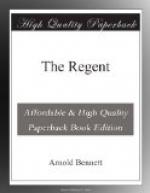“Where to, sir?”
“262 Eaton Square,” said Edward Henry.
“Thank you, sir,” said the aged menial, and repeated in a curt and peremptory voice to the chauffeur, “262 Eaton Square!” Lastly he touched his cap.
And Edward Henry swiftly left the precincts of the headquarters of political democracy in London.
V
As he came within striking distance of 262 Eaton Square he had the advantage of an unusual and brilliant spectacle.
Lord Woldo was one of the richest human beings in England—and incidentally he was very human. If he had been in a position to realize all his assets and go to America with the ready money, his wealth was such that even amid the luxurious society of Pittsburg he could have cut quite a figure for some time. He owned a great deal of the land between Oxford Street and Regent Street, and again a number of the valuable squares north of Oxford Street were his, and as for Edgware Road—just as auctioneers advertise a couple of miles of trout-stream or salmon-river as a pleasing adjunct to a country estate, so, had Lord Woldo’s estate come under the hammer, a couple of miles of Edgware Road might have been advertised as among its charms. Lord Woldo owned four theatres, and to each theatre he had his private entrance and in each theatre his private box, over which the management had no sway. The Woldos in their leases had always insisted on this.
He never built in London; his business was to let land for others to build upon, the condition being that what others built should ultimately belong to him. Thousands of people in London were only too delighted to build on these terms; he could pick and choose his builders. (The astute Edward Henry himself, for example, wanted furiously to build for him, and was angry because obstacles stood in the path of his desire.) It was constantly happening that under legal agreements some fine erection put up by another hand came into the absolute possession of Lord Waldo without one halfpenny of expense to Lord Woldo. Now and then a whole street would thus tumble all complete into his hands. The system, most agreeable for Lord Woldo and about a dozen other landlords in London, was called the leasehold system; and when Lord Woldo became the proprietor of some bricks and mortar that had cost him nothing, it was said that one of Lord Woldo’s leases had “fallen in,” and everybody was quite satisfied by this phrase.
In the provinces, besides castles, forests and moors, Lord Woldo owned many acres of land under which was coal, and he allowed enterprising persons to dig deep for this coal, and often explode themselves to death in the adventure, on the understanding that they paid him sixpence for every ton of coal brought to the surface, whether they made any profit on it or not. This arrangement was called “mining rights,” another phrase that apparently satisfied everybody.




